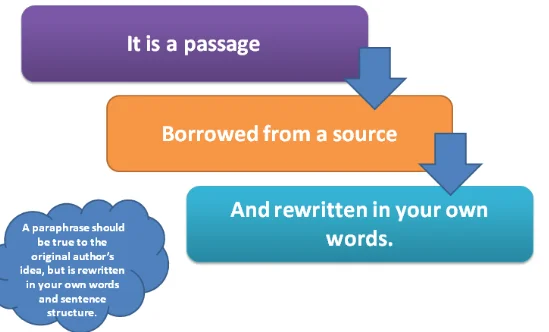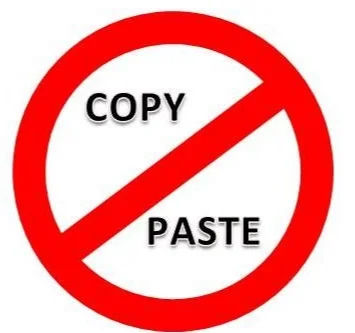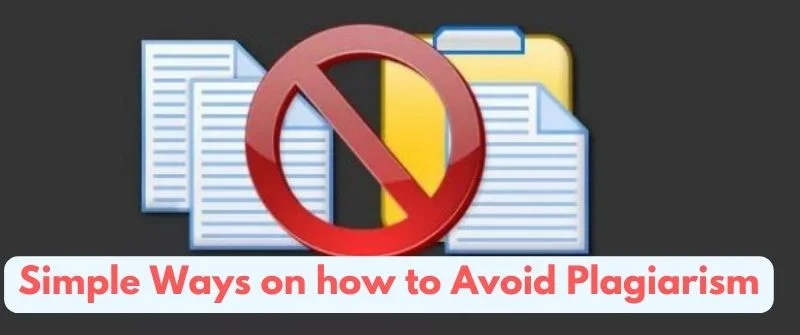Plagiarism is one of the most common academic offenses that students can commit. Nobody wants to get caught, but there is always the fear of the consequences.
If you are struggling with avoiding plagiarism or need tips on how to get away with it, check out this quick guide.
How to Get Away With Plagiarism
1. Paraphrase
Paraphrasing is a process of rewriting that occurs when you restate an idea or statement by using different words or sentence structures. It is an essential study skill for students to develop.

It is rephrasing something others said to avoid copyright infringement or personalize a particular work. You can use it to simplify a text, reformulate a statement, and overcome plagiarism.
2. Screenshot and Paste Pictures
It becomes challenging for a plagiarism tool to decode what is in the screenshots. The tool will scan and evaluate only written text in the correct format. Using a screenshot from a particular source will make it hard for any anti-plagiarism software to detect the content and analyze it for originality.
Moreover, if you paste pictures, it will also be difficult for the plagiarism detection software to determine if it is original or not. It lacks a mechanism to identify the originality and rate it according to its parameters.
3. Use Quotes
Whenever you want to quote an exact phrase from the works of another author, it is advisable to use quotes. For you to indicate that it is a direct quote from you, one should enclose the phrase in the quotation marks.
The best practice is to use quotation marks sparingly. Furthermore, let it not include large junks of texts. You should only use them if you want to highlight a certain idea that you wish to expound on while giving your arguments. Not to forget, if you are using one’s idea, it is important to reference it.
4. Copy Points Only
Another effective method of avoiding plagiarism is to copy points only. You should be careful as you copy points since writing them word to word can still activate flagship. Avoid using the copy and paste function, which will reflect a word-to-word affair.

You should read and copy the points in your own words without changing the meaning of the context.
That means one should have effective paraphrasing skills to overcome the temptation of repeating the same words as collected from the source.
During copying points, you should try to remain concise and clear. Using the same words in a long sentence may cause lead to plagiarism.
Read our guide on how you can copy without plagiarizing.
5. Upload PDF
Turnitin cannot detect a PDF under normal circumstances. Therefore, there is no reason to be concerned that your paper will be detected as plagiarized by Turnitin if it contains a PDF.
Uploading your assignment in pdf format can be key to avoid plagiarism. How does it do the trick? Plagiarism checkers use special software to detect the source of your content, and if that particular source is online, it will be easy to detect.
6. Get Ideas
You can use a source to get ideas and craft unique content without plagiarizing it. Such means that you have to process those new ideas into a unique format and present them well to further your arguments.
If your ideas are coming from online sources, you should ensure that they remain original with a unique angle. If you are riding on the ideas of other authors, you should cite them will to overcome plagiarism cases.
Also, you should read on many topics widely. That means that you have to search for them from various authors who have a grip on a particular topic. Reading is a great investment if you want to discover the perspective of the author over a certain matter that you are investigating.
Why plagiarism is bad
Copying someone else’s work and passing it off as your own is called plagiarism. Here are reasons why such an act is wrong and should be avoided by students across the world.
1. Career Reputation
Plagiarism is a very serious problem that can lead you to be expelled from the institution. Sometimes have no idea they plagiarized someone else’s work until it has been pointed out to them by the plagiarism detector we use or by another member of the community.
2. Academic offense
Plagiarism is a major academic offense. We term it as cheating and/or fraud because someone has written/spoken something that is not their own. In addition, such a person presented this piece of work as the original, indicating claimed it as their own original work.

Plagiarism is a serious issue. It has been around for as long as there have been written works.
It is not going away – colleges and even some universities are calling for stronger penalties for this behavior.
Once guilty, you will face disciplinary action based on the university policy. If it is a light attempt, you can negotiate with your faculty to do a revision. Sometimes it could only be as a result of poor citation.
3. Plagiarism Devalues your Work
If everyone simply plucks words and ideas off the Internet and calls it their own, there’s nothing unique or special being offered by your business. No one will no longer value what you do as they will mark you as a thief.
Plagiarism can damage your GPA and give you that guilty feeling of wrongdoing. Why? Because plagiarism is wrong, and there is no way to justify it! So, how does one prevent the fall into this abyss? Make sure at the beginning of your academic career to keep yourself out of trouble.
4. Loss of Credibility
In today’s world, utilizing someone else’s words as your own is one of the quickest ways to lose credibility and face a lawsuit. Plagiarism is an issue for students in schools, universities, and academic institutions.
Teachers, professors, and employees across the globe are realizing the need for anti-plagiarism software to combat this issue. Plagiarism is a form of lying–and lying will destroy your reputation as well as your credibility.
5. Plagiarism is Stealing

Plagiarizing someone else’s work is unfair to that person because they deserve credit for their ideas and their words.
A writer spends years honing his or her craft.
Besides, he does researching, writing, and editing before an article, novel or dissertation is submitted for publication or grading; while they may receive payment.
They deserve more than just money for all their hard work-they deserve recognition too!
6. Deprives Respect
Plagiarism hurts everyone involved–the plagiarizer, the person whose words were stolen, and his or her readers. You will be caught–either by the original author or by the plagiarism checker software used by most universities and employers.
Plagiarism is also a criminal offense, and many people have lost their jobs and their reputations as a result of plagiarizing someone else’s work.
7. Laziness
There are many reasons why students plagiarize. But none is justified as it is a way of promoting laziness. It takes energy, thought, and creativity to come up with original content that no one has ever seen before. It takes none of those things to copy and paste what someone else has written and claim it as your own.
Plagiarism is like a self-portrait that reveals your character flaws: dishonesty, lack of imagination, and inability to accept responsibility for your own actions.
8. Kills Morale
Plagiarism is bad because it undercuts honest writers. Writers work hard to put together content that readers want to read and enjoy reading. When you cut corners and take others’ content without giving them credit, you undercut the market for honest writers who are not plagiarizing others’ works.”

